Black Shadow: Difference between revisions
Rzombie1988 (talk | contribs) |
|||
| (2 intermediate revisions by 2 users not shown) | |||
| Line 56: | Line 56: | ||
In [[1976]] he returned to lucha libre but he was too old and injured to do anything in the ring. He kept wrestling until [[July]] of [[1981]], when the [[Mexico]] DF Commission of Box and Lucha didn't let him renew his license due to his poor state of health. He then wrestled something in Los Angeles, but left the business forever before the year had finished. | In [[1976]] he returned to lucha libre but he was too old and injured to do anything in the ring. He kept wrestling until [[July]] of [[1981]], when the [[Mexico]] DF Commission of Box and Lucha didn't let him renew his license due to his poor state of health. He then wrestled something in Los Angeles, but left the business forever before the year had finished. | ||
Shadow never gave a lot of interviews after his retirement and he has always refused to appear in any lucha cards as a guest legend. During the late 80s, a young wrestled that used to be called [[Pequeño Solín]] asked him the right to wrestle as Black Shadow Junior. Shadow agreed, because his sons never wanted to wrestle. However there has been many other copies called "Black Shadow Junior" and "Hijo del Black Shadow" that never asked permission to the original one. | Shadow never gave a lot of interviews after his retirement and he has always refused to appear in any lucha cards as a guest legend. During the late 80s, a young wrestled that used to be called [[El Hijo de Black Shadow (Original - 1985) | Pequeño Solín]] asked him the right to wrestle as Black Shadow Junior. Shadow agreed, because his sons never wanted to wrestle. However there has been many other copies called "Black Shadow Junior" and "Hijo del Black Shadow" that never asked permission to the original one. | ||
In his latter life he sold bags in the [[Hidalgo]] Market, at the Colonia Obrera in [[Mexico City]]. He had trouble walking and could only do so aided by a walking stick. | In his latter life he sold bags in the [[Hidalgo]] Market, at the Colonia Obrera in [[Mexico City]]. He had trouble walking and could only do so aided by a walking stick. | ||
| Line 72: | Line 72: | ||
{{aline|[[1946|46]]/[[07/14]]|mask/hair|[[Black Shadow]]|[[Oso Negro]]|[[Arena Canada Dry, Guadalajara, Jalisco]]}} | {{aline|[[1946|46]]/[[07/14]]|mask/hair|[[Black Shadow]]|[[Oso Negro]]|[[Arena Canada Dry, Guadalajara, Jalisco]]}} | ||
{{aline|[[1952|52]]/[[November 7|11/07]]|mask|[[El Santo]]|[[Black Shadow]]|[[Arena Coliseo]] - [[Mexico City]]}} | {{aline|[[1952|52]]/[[November 7|11/07]]|mask|[[El Santo]]|[[Black Shadow]]|[[Arena Coliseo]] - [[Mexico City]]}} | ||
{{aline|[[ | {{aline|[[1953]]/[[10/30]]|hair|[[Black Shadow]]|[[Tony Borne]]|[[Arena Coliseo]]}} | ||
{{aline|[[1962|62]]/[[August 10|08/10]]|hair|[[Black Shadow]]|[[Jorge Allende]]|[[Guatemala]]}} | {{aline|[[1962|62]]/[[August 10|08/10]]|hair|[[Black Shadow]]|[[Jorge Allende]]|[[Guatemala]]}} | ||
{{aline|[[1965|65]]/[[April 30|04/30]]|hair|[[René Guajardo]]|[[Black Shadow]]|[[Arena México]] - [[Mexico City]]}} | {{aline|[[1965|65]]/[[April 30|04/30]]|hair|[[René Guajardo]]|[[Black Shadow]]|[[Arena México]] - [[Mexico City]]}} | ||
| Line 82: | Line 82: | ||
{{aline|[[1969|69]]/[[04/25]]|hairs|[[Black Shadow]] & [[Ray Mendoza]]|[[Los Hippies]] ([[Renato Torres]] & [[El Vikingo]])|[[Arena México]]}} | {{aline|[[1969|69]]/[[04/25]]|hairs|[[Black Shadow]] & [[Ray Mendoza]]|[[Los Hippies]] ([[Renato Torres]] & [[El Vikingo]])|[[Arena México]]}} | ||
{{aline|1971/07/11|hair|[[Katsuhisa Shibata]]|[[Black Shadow]]|[[Auditorio del Estado, Guadalajara, Jalisco]]}} | {{aline|1971/07/11|hair|[[Katsuhisa Shibata]]|[[Black Shadow]]|[[Auditorio del Estado, Guadalajara, Jalisco]]}} | ||
{{aline|[[1978]]/[[12/10]]|hair|[[Black Shadow]]|[[Luis Mariscal]]|[[Naucalpan]]}} | |||
{{aend|'''(1)''' mask vs $5,000 pesos}} | {{aend|'''(1)''' mask vs $5,000 pesos}} | ||
Latest revision as of 12:35, 1 December 2020
Profile
| Black Shadow | |||||||||||||||||||||||||||||
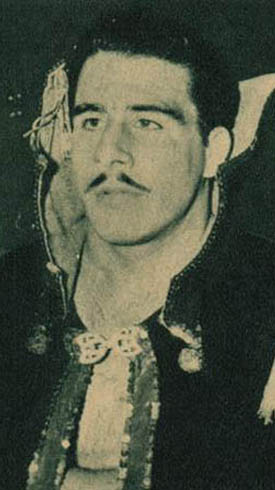 |
|
||||||||||||||||||||||||||||
| Wrestling Observer Hall Of Fame Member |
|---|
Biography
Alejandro Cruz was born in the city of León, Guanajuato. He grew up idolizing the likes of Chino Achiu, Henry Pilusso and Murciélago Velázquez, and while he was a lucha enthusiast, his initial ambitions were to seek a career as a professional musician. He moved to Guadalajara to purse those dreams but he eventually gave up and abandoned them for lucha libre. Before becoming a luchador, he worked as a shoemaker, and he practiced some sports like cliffdiving and football (soccer).
His professional debut was a loss against Rito Romero on June 21, 1942 at the Arena "Canada Dry" in Guadalajara. He used the name "Jungla" Cruz, which he didn't really like, and his first outfit was made out of leather. Jungla Cruz was a popular newspaper comic strip character so the promoter he first wrestled for, an Arab called Elías Simón, gave him that name.
He soon started using his real name instead and moved to Monterrey, where he met Blue Demon, who became his best friend in the business. Demon taught him how to train properly and perfected his Amateur wrestling technique as well.
At first he was your basic lucha libre wrestler. He could go to the mat, he could get rough and he had a few nice holds, but once during a match against Gorilita Flores (the man is said to be the first to use a plancha) he decided to experiment with other flying maneuvers.
When he decided upon a name change he came up with the "Sombra Negra" name, which is the Spanish translation for Black Shadow, however some of his lucha partners agreed that the English translation would have a more effective ring to it. His first match under that name was on May 16, 1947 when he defeated Rolando Vera. I have also heard that he made his debut as Black Shadow against Santo beating him on two straight falls, but I believe that was his Arena Coliseo debut under the name.
Shadow is often credited as the father of the high flying lucha libre and as the creator of the tope (headbutt), as he'd often use an slingshot tope and a flying cross tope, among others, during his matches. In all reality, Leroy McGuirk and Chino Achiu among others were already using that move back in 1933.
He was called "El Hombre de Goma" (The Elastic Man) due to his incredible elasticity. He never trained with weights and focused in aerobics, because he preferred to have speed than strength.
Due to his Demon connection in 1952 he started wrestling for EMLL's big buildings as a rudo teaming with Blue Demon. They were referred to as "Los Hermanos Shadow" because they once were the last two men in a battle royal and they said that they could not wrestle each other because they were brothers.
As a duo they faced the best Mexico had to offer but they had an especially bitter rivalry with the Atomic Pair of El Santo and Gory Guerrero. Santo and Shadow developed a singles rivalry and Shadow ended up challengeing Santo to a mask vs. mask match.
That mask match, held on Friday 7th of November, 1952 at La Arena Coliseo, is still considered the most important match in the history of lucha libre in Mexico. The match was such a big deal among the fans and the press, that even though there had been mask vs. mask matches in the past, many agree that this one bout is what skyrocketed the immense popularity of mask vs. mask matches as the biggest thing in lucha libre - a popularity that nowadays is still as high as it was the first day.
This 70 minutes long heated match obviously sold out the building. Shadow lost in the third fall and he was revealed to be Alejandro Cruz Ortíz. A fun fact from that match is that Santo never got for his trophy museum the mask that Shadow was wearing during that match, as Shadow gave Santo(through Demon) a cheaper mask.
Many predicted that Shadow's career was done now that he had lost his mask, but then some stations started to show the luchas on TV, and a new generation of lucha magazines with better photographers was just rising, so the cameras added a new dimension to his flashy flying moves and his career as a main eventer got extended a few more years.
Due to his risky style, Shadow had many injuries so when he was out and wouldn't wrestle, he would work as a shoemaker like he did as a youngster. In 1955 Shadow fell off the third floor of a building to the street, but luckily, nothing happened to him and he just got up a bit hurt from the fall but nothing was broken or seriously hurt.
On October 30, 1958, Black Shadow beat the American wrestler Tony Borne in a hair vs. hair match. This match was a big deal because Borne once unmasked Shadow's "brother" Blue Demon in the middle of a match so he'd always get monster heel heat in any arena he showed up.
Shadow's career went down from there and even though he still had big profile feuds and matches (for instance his rivalry with Dory Dixon that ended in a series of a hair vs. hair matches), it was not like in the old times.
In 1970, Shadow appeared at the Los Campeones Justicieros (Champions of Justice) movie with Blue Demon, Mil Máscaras, Tinieblas and others.
He was out during a lot of time in the 70s due to injuries (he had surgery twice in one of his knees), but he saved up a lot of the money he earned as a luchador and opened his own hotel near the dock of Acapulco, where a lot of his old wrestling partners would sleep when they had to wrestle there. He also worked as the treasurer of the Mexico D.F. wrestling commission during some time.
In 1976 he returned to lucha libre but he was too old and injured to do anything in the ring. He kept wrestling until July of 1981, when the Mexico DF Commission of Box and Lucha didn't let him renew his license due to his poor state of health. He then wrestled something in Los Angeles, but left the business forever before the year had finished.
Shadow never gave a lot of interviews after his retirement and he has always refused to appear in any lucha cards as a guest legend. During the late 80s, a young wrestled that used to be called Pequeño Solín asked him the right to wrestle as Black Shadow Junior. Shadow agreed, because his sons never wanted to wrestle. However there has been many other copies called "Black Shadow Junior" and "Hijo del Black Shadow" that never asked permission to the original one.
In his latter life he sold bags in the Hidalgo Market, at the Colonia Obrera in Mexico City. He had trouble walking and could only do so aided by a walking stick.
Black Shadow passed away on March 8, 2007 in Mexico City from neumonia.
Luchas de apuestas record
Gallery
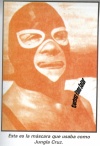 |
 |
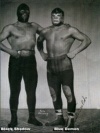 |
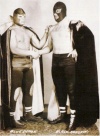 |
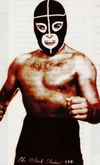 |
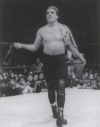 |
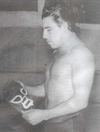 |
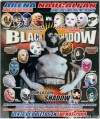 |
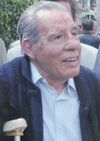 |
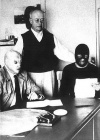 |
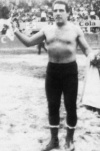 |
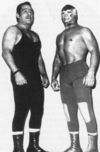 |
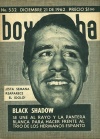 |
 |
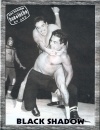 |
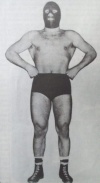 |
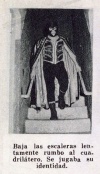 |
 |
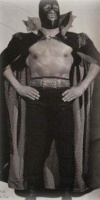 |
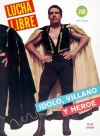 |
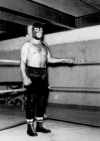 |
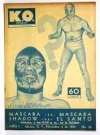 |
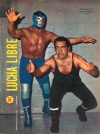 |
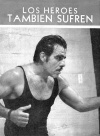 |
 |
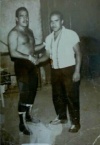 |